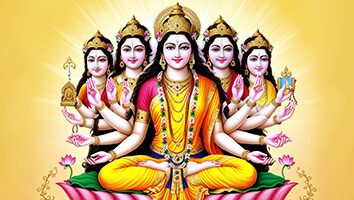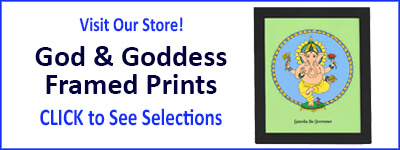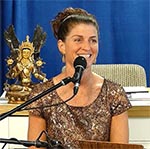Gayatri Mantra in English
The Gayatri mantra is sometimes called the Master Mantra. Understanding the Gayatri Mantra in English helps to reveal the depth of the meaning of this sacred prayer. This mantra is associated directly with the Gayatri yantra symbol. The meaning of the Gayatri yantra is covered in detail in the article Gayatri Yantra Meaning.
The Goddess Gayatri is an emanation of the Goddess Saraswati. She is also known as Savitir, the consort of the deity Surya, and as Vedamata, meaning Mother of the Vedas. Surya is the sun god, honored in many mantras and stories.
Opening Invocation in the Gayatri Mantra
The first line is of the most well-known Gayatri mantra is actually a general invocation. This is not technically part of the original sacred text from which the mantra is drawn. Here are the Sanskrit words for this mantra:
Om bhur bhuvah svaha
Tat savitur vareñyam
Bhargo devasya dhīmahi
Dhiyo yonah prachodayat
Share this page with a friend!
Watch nearly 400 videos on the Vocal Medicine Channel!
English Meaning of the Gayatri Mantra
Simple, Condensed English Meaning
“Let me meditate on the most adored Lord and Creator, whose divine light illumines all realms (physical, mental and spiritual). May this divine light illuminate my life!”
Extended English Meaning of the Gayatri Mantra
“O God, the Protector, the basis of all life, Who is self-existent, Who is free from all pains and Whose contact frees the soul from all troubles, Who pervades the Universe and sustains all, the Creator and Energizer of the whole Universe, the Giver of happiness, the most Excellent, Who is Pure and the Purifier of all, let us embrace that very God, so that He may direct our mental faculties in the right direction.”
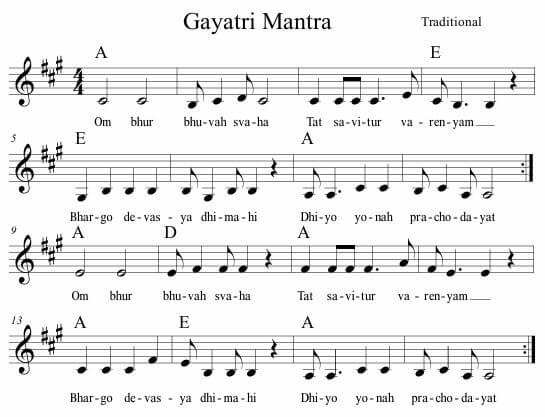
Word for Word Meaning in English
Om: the primeval sound
Bhur: the physical body and physical realm
Bhuvah: the life force or mental realm
Suvah: the soul or spiritual realm
Tat: God as That, like the Hebrew I AM That I AM
Savitur: the Sun, Creator or Source of all life
Vareñyam: adore
Bhargo: effulgence of divine light
Devasya: the supreme
Dhīmahi: to meditate
Dhiyo: the intellect
Yo: may this light
Nah: our
Prachodayāt: illumine or inspire
Amazing Story: Origin of the Gayatri Mantra
There was once a king who ruled most of the earth a long, long time ago. His name was Viswamitra. In Viswamitra’s kingdom, everyone was happy. The level of spirituality was quite high. Viswamitra’s armies protected all of their lands.
The Warrior King Tours His Kingdom
Viswamitra decided that he needed to take a tour of his kingdom. His kingdom was so large that this effort took an entire year. He brought an army of 1,000 soldiers along in case they were needed. Everything went quite well.
Visiting a Forest Hermitage
At the end of the year, they approached their final stop: a hermitage deep in the forest where the guru of the king lived. The king’s guru was named Vahistha. The forest ashram was small, but beautiful and peaceful. The fruit trees were lush. The animals of the forest loved to be near the small group of householders and devotees.
King Viswamitra and His Guru Vahistha Converse
Viswamitra and Vahistha had a pleasant conversation together. The king assured his guru that all was well in the kingdom, thanks to the prayers, mantras and rituals performed by Vahistha and his disciples. In turn, Vahistha assured the king that his ashram had all of the land and cows and support that they needed for their livelihood and services.
Vahistha Offers a Feast
Vahistha is concerned that the king and his men must be tired and hungry from their long expedition. He offers to prepare a feast for them. The king cannot understand where they will get sufficient food, but he does not want to be rude. He accepts the offer.
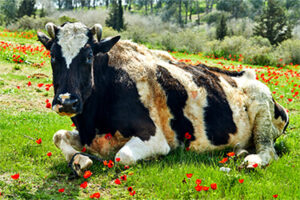
Vahistha’s Magical Cow
Vahistha looks out into a nearby pasture and calls a beautiful cow to his side. He asks the cow to produce a banquet. Out of the belly of the cow emerges silver platters covered with food, crystals goblets filled with refreshing drinks, and tables to hold the magnificent feast. The army of a thousand men eat to fullness as the food refills the platters endlessly.
The King Desires to Have the Cow
Now King Viswamitra decides that he must have the cow for himself. He imagines all of the fantastic feasts that he can provide for foreign dignitaries and others. He offers 10,000 cows in return for the magical cow. Vahistha refuses.
Viswamitra Wants to Buy the Magical Cow
Viswamitra offers 14,000 war elephants. Vahistha refuses. The king offers 11,000 of his best horses. Vahistha again refuses. Finally, the king offers 800 chariots filled with gems. Vahistha refuses. Now the king is becoming angry.
Vahistha Refuses to Sell the Cow
Viswamitra reasons that the land and the entire hermitage are his. Therefore, he can take what he wants. His guru Vahistha replies that the cow was given to him by God for the benefit of his hermitage. The cow is not for sale at any price.
Disaster Strikes
In his anger, the king commands his soldiers to capture the cow. Vahistha responds by commanding the cow to protect herself. out of her belly pour thousands of soldiers who kill Viswamitra’s entire army. Viswamitra realizes that this divine power is greater than any he himself possesses. Humiliated and alone, he retreats to the Himalayas.
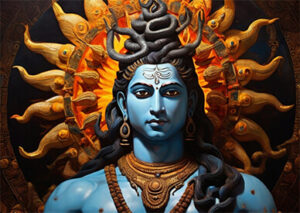
Viswamitra Becomes a Shiva Devotee
Since Viswamitra is seeking the power of revenge for his humiliation, he becomes a devotee of the god Shiva, known for his destructive power. Viswamitra’s discipline as a warrior helps him to perform great austerities and yogic feats. He learns to eat only berries and leaves. He stands in freezing cold rivers to mediate. He stands in the sun on the edge of cliffs to meditate. He chants to Shiva for 1,000 years.
Shiva Grants a Boon
Finally, Shiva appears to grant a boon to Viswamitra. A boon is a special gift that has been earned through tremendous effort. Viswamitra asks for the power of fire, water, and wind. He also asks for the power of venomous snakes. Finally, he requests the ferocity of all wild animals.
Viswamitra Returns for Vengeance
Viswamitra returns to the hermitage. he uses the power of fire to incinerate every hut; every tree; every meadow; every anima;, every man, woman and child. Then Viswamitra calls on the power of water. Everything that remains is uprooted and destroyed. His guru Vahistha appears and holds forth a staff of power. The staff absorbs all of the power of water in the world. Vahistha is unhurt.
Vahistra Absorbs All of the Weapons of Nature
Next, Viswamitra calls on the power of air. Vahistra’s staff absorbs the power of wind and hurricanes. Finally, Viswamitra call on the Brahmastra. The Brahmastra holds the power of all creation. This power emerges from Viswamitra’s third eye. However, Vahistra’s staff absorbs all of the power of creation.
The Power of a Brahma Rishi
Now Viswamitra sees his mistake. His guru Vahistha is a Brahma Rishi. This is the highest type of rishi. Vahistra’s word is the word of God. Nothing can destroy him. Viswamitra has been defeated again. Now he wants to have God’s power not for revenge but to atone for his grave errors.
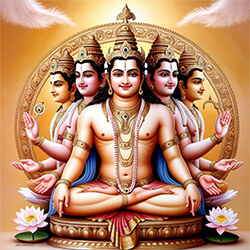
Viswamitra Returns to his Meditations
Viswamitra’s determination has been renewed. Now he desires power to atone rather than to destroy. He meditates on Brahma for 1,000 years. Now the creator God appears. Viswamitra is given the title of Raja Rishi. This means the “King Seer” or the royal sage. However, Viswamitra knows this is not as high a title as Brahma Rishi. He knows that somewhere in his 1,000 years of meditation, there was a flaw.
Viswamitra Examines Himself
He remembers a day when he was mediating and a bird began to sing. Disturbed, he cursed the bird. He begins to examine his anger and realizes that his mediatation is still for the sake of ambition and desire. He must learn to meditate only for the sake of loving God.
Vishnu Appears to Viswamitra
Now the God Vishnu appears, the preserver of life. He grants Viswamitra the title of Brahma Rishi. Viswamitra receives a staff similar to that of his guru Vahistha. Next Viswamitra seeks a way to atone for his former destructive state.
Viswamitra Travels Forward in Time
Vishnu sends him forward in time to experience the Dark Ages that are coming. Viswamitra has attained God through the determination and willpower of a warrior. The days are coming when humankind will need powerful tools to survive spiritually.
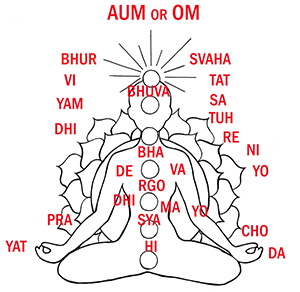
The Gayatri Mantra Is Heard for the First Time
Viswamitra begins to mediate fervently on ways to assist mankind. He begins to hear a sound. The sound grows to a series of 24 golden syllables. The Gayatri Mantra is the gift that Viswamitra will give to mankind for their freedom and liberation from suffering. The Gayatri Mantra is the foremost mantra from the Rig Veda (Mandala 3, Hymn 62, Verse 10), the oldest and most sacred text in India.
Gayatri Mantra in English Versus Sanskrit
Some have mapped the syllables of the Gayatri Mantra to the human body, believing that the syllables stimulate spiritual centers for both health and liberation. The Gayatri Mantra in English is helpful for understanding the intention of the mantra and the connection to the Sun as the supreme deity. However, the sounds themselves are said to be the key factor.
Sound and the Human Energy System
Each sound travels along the nadi and meridians or energy channels of the human body. The two main nadi are along the spine, entwined from the base to the top. Other energy centers include the seven main chakras as well as many minor chakras. Learn more about the chakra and energy systems in all of our Chakra Resources.
Author Kathleen Karlsen
Kathleen Karlsen is a musician, artist, writer and speaker. She is the author of two books (Flower Symbols and Vocal Medicine) and over 200 articles. Kathleen, her husband Andrew, and their five children live in Bozeman, Montana. More about Kathleen Karlsen.
ARTICLE SUMMARY: GAYATRI MANTRA IN ENGLISH
This article tells the story of the origin of the Gayatri Mantra and includes multiple English translations. The English meaning of the Gayatri Mantra is provided word for word with the Sanskrit text. The connection between this mantra and Hindu deities as well as the human body are considered.

